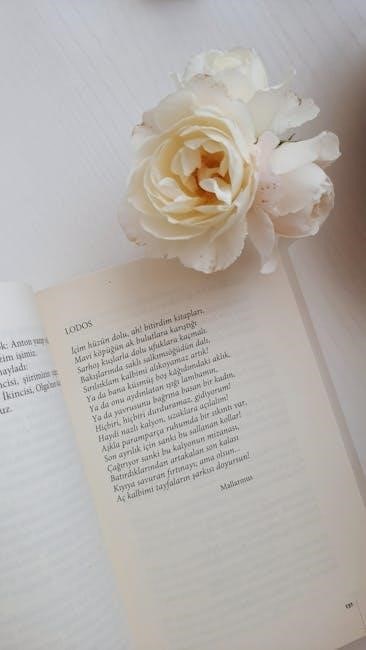“Yourself to Blame” by Mayme White Miller is a thought-provoking poem that emphasizes personal responsibility and self-reliance. It encourages readers to reflect on their actions and embrace accountability‚ offering timeless wisdom for growth and self-improvement.
Overview of the Poem
The poem “Yourself to Blame” by Mayme White Miller is a concise and impactful work that explores themes of personal responsibility and self-awareness. Through simple yet profound language‚ it urges readers to reflect on their own actions and decisions rather than blaming external circumstances or others for their misfortunes. The poem highlights how individuals often shift responsibility away from themselves‚ using excuses like “Had it not been for so-and-so‚ things wouldn’t have gone that way.” It emphasizes the importance of introspection‚ encouraging readers to examine their own flaws and shortcomings. The poem’s message is universal‚ resonating with anyone who has faced setbacks or struggled with accountability. Its straightforward structure and rhythmic flow make it accessible and memorable‚ while its core idea of self-reflection and growth continues to inspire readers of all ages. The poem has been widely shared and discussed‚ often recommended for its timeless wisdom and motivational appeal.
Author Background: Mayme White Miller
Mayme White Miller was an American educator and poet‚ best known for her works that emphasized moral lessons and personal growth. Her background in education deeply influenced her writing‚ as she sought to impart wisdom and life principles through her poetry. Miller’s poem “Yourself to Blame” reflects her belief in the importance of self-reflection and accountability‚ themes she often shared with her students and children. She was particularly known for using her poetry as a tool to guide young minds toward self-awareness and responsibility. Miller’s work resonated widely‚ and her poem has been widely circulated in various formats‚ including PDF‚ for its timeless message of personal responsibility. Her legacy as both a teacher and a poet continues to inspire readers‚ encouraging them to embrace their role in shaping their own lives and outcomes.
Key Themes: Responsibility and Self-Reliance
The poem “Yourself to Blame” by Mayme White Miller centers on the themes of personal responsibility and self-reliance‚ urging readers to embrace accountability for their actions and circumstances. It critiques the tendency to shift blame onto others‚ emphasizing that true growth comes from self-examination and owning one’s mistakes. The poem advocates for a mindset of proactive engagement with life‚ encouraging individuals to recognize their role in shaping their outcomes. By highlighting the consequences of avoiding accountability‚ Miller’s work serves as a motivational call to adopt a self-aware and resilient approach to life’s challenges. These themes resonate universally‚ making the poem a timeless guide for personal development and moral reflection. The emphasis on self-reliance underscores the idea that true empowerment lies within‚ encouraging readers to take charge of their lives and futures.

Analysis of Major Themes
The poem explores accountability and self-reflection‚ challenging readers to embrace responsibility rather than blame others‚ fostering resilience and personal growth through introspection and self-awareness.
Personal Accountability
The poem “Yourself to Blame” by Mayme White Miller underscores the importance of personal accountability‚ urging readers to take responsibility for their actions and circumstances. It challenges the tendency to shift blame onto others‚ emphasizing that true growth begins with self-reflection. The poem argues that individuals must acknowledge their role in life’s setbacks rather than attributing them to external factors. This theme is reinforced through lines like‚ “You have yourself to blame‚” which serve as a reminder to examine one’s own faults and shortcomings. By advocating for self-awareness and accountability‚ the poem encourages readers to embrace their agency and work toward personal improvement. This message resonates universally‚ making the poem a powerful tool for fostering resilience and maturity. Miller’s work‚ often shared with her children‚ reflects her belief in the transformative power of taking ownership of one’s life.
The Trap of Blaming Others
The poem “Yourself to Blame” by Mayme White Miller highlights the futility of blaming others for one’s misfortunes. It critiques the common tendency to deflect accountability by pointing fingers at external circumstances or individuals. Miller illustrates this through lines such as‚ “Why do we fault others?” and “Had it not been for so-and-so‚ things wouldn’t have gone that way.” These phrases reveal how blaming others becomes a convenient escape from self-examination. The poem argues that this mindset traps individuals in a cycle of victimhood‚ preventing genuine growth. By emphasizing personal responsibility‚ Miller encourages readers to break free from this trap and confront their own shortcomings. The poem serves as a poignant reminder that true progress begins with acknowledging one’s role in their challenges‚ rather than attributing them to others. This theme is central to the poem’s message of empowerment and self-awareness.
Self-Reflection and Growth
The poem “Yourself to Blame” by Mayme White Miller underscores the importance of self-reflection as a catalyst for personal growth. It encourages readers to introspect and identify their own flaws rather than shifting blame. Lines such as “Make an examination‚ you’ll find that faults in you” emphasize the need for honest self-assessment. This process of self-awareness allows individuals to recognize their role in life’s challenges‚ fostering accountability and maturity. By confronting personal shortcomings‚ readers can break free from cycles of blame and negativity‚ leading to meaningful transformation. The poem suggests that true growth arises when individuals take ownership of their actions and choices‚ enabling them to improve and move forward. This message of self-reflection and growth resonates deeply‚ offering readers a pathway to greater self-understanding and empowerment. Miller’s words serve as a timeless reminder of the power of introspection in shaping a better life.

Structure and Style
The poem features a simple yet impactful structure‚ utilizing rhyme and rhythm to convey its message. Miller’s direct language and reflective tone enhance the themes of responsibility and self-awareness‚ making the poem relatable and memorable.
Poetic Devices Used
Mayme White Miller’s poem employs several poetic devices to reinforce its themes. Rhyme and rhythm are used effectively to create a memorable and impactful structure. The repetition of phrases like “You have yourself to blame” emphasizes personal accountability. Metaphorical language‚ such as comparing life’s mishaps to a “prison of resentment‚” adds depth and vivid imagery. The poem also utilizes a reflective tone‚ encouraging readers to introspect and take ownership of their actions. Simple yet powerful language makes the message accessible and relatable. These devices collectively enhance the poem’s ability to convey its central idea of self-responsibility and growth‚ making it both thought-provoking and enduring.
Language and Tone
The poem “Yourself to Blame” by Mayme White Miller is written in a straightforward and accessible language‚ making its message clear and relatable. The tone is reflective and assertive‚ urging readers to take responsibility for their actions. Miller uses a serious yet encouraging voice‚ emphasizing the importance of self-accountability. The direct and uncomplicated style helps convey the poem’s central theme effectively. The language avoids complexity‚ ensuring the message resonates with a wide audience. The tone shifts between firm reminders of personal responsibility and gentle encouragement for self-improvement. This balance creates a motivating and thought-provoking experience for readers‚ pushing them to reflect on their own lives and choices; The overall language and tone work harmoniously to reinforce the poem’s enduring message of self-reliance and growth.

Historical and Cultural Context
The poem “Yourself to Blame” by Mayme White Miller reflects timeless wisdom on personal responsibility‚ resonating across cultures and generations. Its message of self-accountability has endured‚ inspiring readers globally since its creation.
Reception Over Time
The poem “Yourself to Blame” has gained significant recognition for its timeless message of personal responsibility. Initially shared within familial circles‚ it later gained popularity through Dr. Ben Carson’s references in his books and interviews. Over the years‚ its universal themes have resonated with diverse audiences‚ making it a favorite for self-reflection. The poem’s straightforward style and relatable imagery have contributed to its enduring appeal‚ as readers from various backgrounds find inspiration in its call to accountability. Its availability in PDF and narrated formats has further expanded its reach‚ allowing it to inspire new generations. The poem’s reception remains overwhelmingly positive‚ with many praising its ability to empower individuals to take charge of their lives. Its cultural impact continues to grow‚ solidifying its place as a cherished piece of motivational literature. The poem’s message remains as relevant today as it was when first written‚ a testament to its enduring wisdom.
Cultural Significance
The poem “Yourself to Blame” holds profound cultural significance as it addresses universal themes of personal responsibility and self-accountability. Its message transcends generations and cultural boundaries‚ resonating with individuals from diverse backgrounds. The poem has been instrumental in shaping mindsets‚ encouraging people to introspect and acknowledge their role in their circumstances. It has become a tool for empowerment‚ particularly in educational and motivational contexts‚ where its teachings are often shared to foster resilience and determination. The poem’s influence extends beyond literature‚ contributing to broader societal discussions on accountability and self-improvement. Its availability in formats like PDF has made it accessible to a global audience‚ further amplifying its impact. As a result‚ “Yourself to Blame” is not just a poem but a cultural beacon that continues to inspire personal growth and self-awareness‚ leaving a lasting legacy in the realm of motivational literature and beyond.
The poem delivers a lasting message of self-accountability‚ inspiring readers to embrace personal responsibility and growth‚ leaving a profound impact on its audience and enduring relevance in modern times.
Impact and Legacy
Mayme White Miller’s Yourself to Blame has left a lasting impact on readers‚ encouraging personal responsibility and self-reflection. Its timeless message resonates across generations‚ inspiring individuals to confront their own roles in life’s challenges. The poem’s simplicity and clarity make it accessible to a wide audience‚ fostering a culture of accountability. Its influence extends beyond literature‚ often shared in educational and motivational contexts to promote self-awareness and growth. The poem’s legacy lies in its ability to empower individuals‚ reminding them that true change begins within. As a cherished piece of poetic wisdom‚ it continues to inspire self-improvement and mindfulness‚ leaving a profound mark on those who engage with its powerful words.
Final Thoughts

“Yourself to Blame” by Mayme White Miller is a poignant reminder of the importance of self-awareness and accountability. The poem’s timeless message challenges readers to look inward‚ acknowledging their role in life’s challenges and opportunities. By emphasizing personal responsibility‚ it encourages individuals to move beyond blame-shifting and embrace growth through self-reflection. Its universal themes resonate across cultures and generations‚ making it a cherished piece of poetic wisdom. The poem’s simplicity and directness ensure its accessibility‚ while its depth invites repeated reflection. As a call to introspection‚ Yourself to Blame leaves a lasting impression‚ inspiring readers to take control of their lives and choices; Its enduring legacy is a testament to the power of poetry to shape minds and hearts‚ offering a pathway to greater self-understanding and empowerment.




